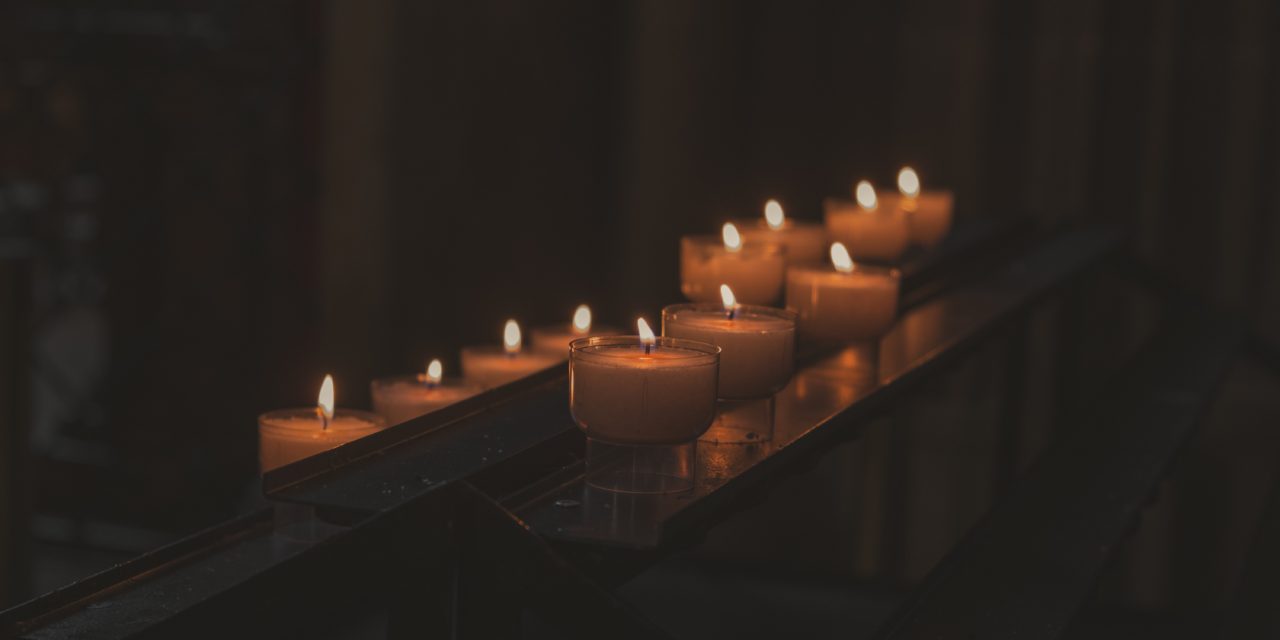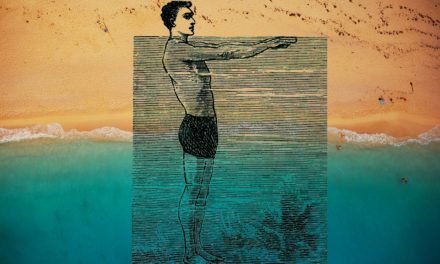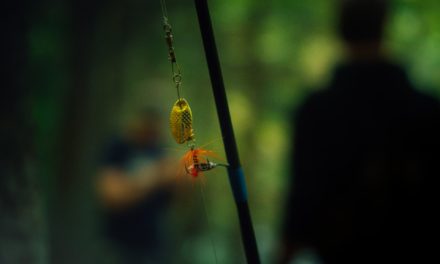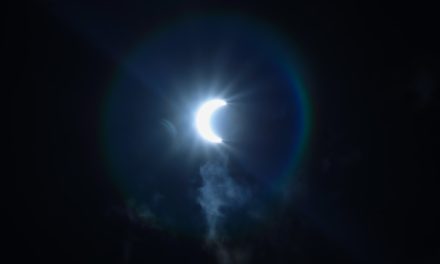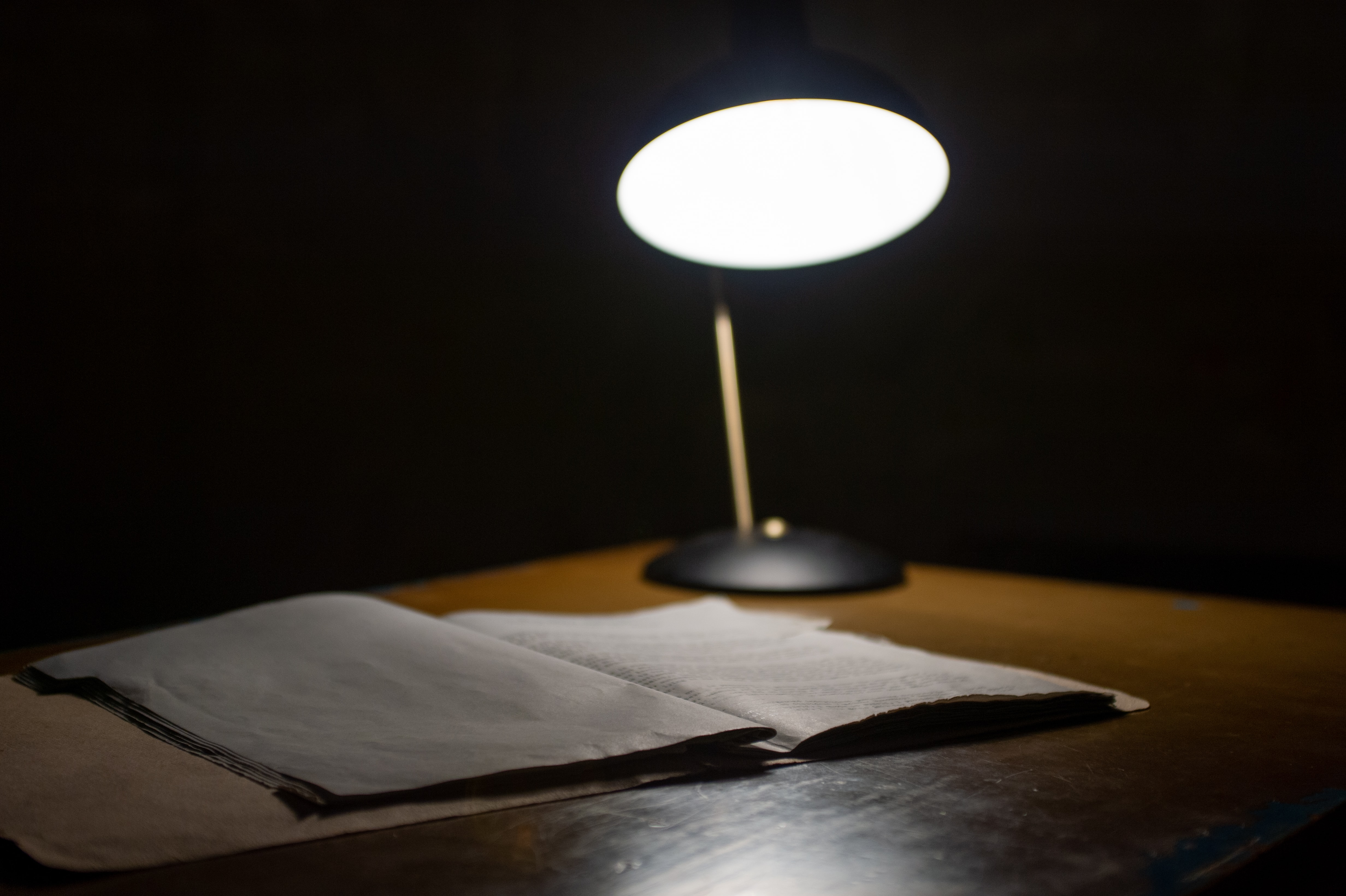When the Curtain Closes
by Jesse Falzoi
It happened on a Tuesday night. The lights went off and the radio stopped and the flame beneath the pot died down.
“This time they will be a bit too al dente, I’m afraid,” Judith said.
Her twelve-year-old daughter stood up and felt her way to the fuse box. Her son, who had turned nine a month ago, ran into his room to get the Ghostbusters kit. Judith looked out the window, at the moonless night, at the sky that was not gray anymore but black, then her son returned and aimed the gun at the wall where a smiling ghost was dancing.
“Gotcha,” he shouted.
“Give me that.” Judith grabbed the pistol and the plastic skull and turned both off. “We’ll need the batteries.”
When her daughter returned she told her to get the candle stand from the living room.
“The fuses are okay,” her daughter said. “It must be something else.” She stepped up to the window. “It’s a blackout, right? Oh my God.”
“Don’t worry. It used to happen all the time when we first moved here.” Judith smiled. “That was before you were born. After the wall came down they had to renew everything. They turned off the gas one day, on another electricity or water. But in the end, they turned everything on again.”
She checked the lighters. One was nearly empty and the other half full. They had twenty-three tea lights and a pile of used and unused candles of all sizes.
“A candlelight dinner,” she turned around and smiled. “Isn’t it nice?”
They sat down to eat. They were lucky. The sauce had been ready for a while and was still hot. Her son had filled their glasses with tap water before the lights went off. They had been waiting for the farfalle and this time they weren’t overcooked. They looked like perfect butterflies.
Judith saw the flickering lights in the distance. Most people seemed to have found candles. Maybe the others weren’t home yet. When the children asked for refills she got up and gave them an apple each. There were nine left.
“You don’t need to brush your teeth tonight,” she said. “And don’t use the flush.”
She took out a clean pot and turned on the faucet. When the water stopped she tried the bathroom, but the pot was only half full as she returned to the kitchen.
“I need to pee,” her son said.
“Don’t use the flush.” Judith put her hand on her daughter’s shoulder. “You watch him,” she said and reached for a shopping bag. “I’ll be back in ten minutes. You can both sleep in my bed tonight. It’ll be very cold in here soon.”
“Where are you going?”
“There’s hardly any milk left.”
Judith held up the candle stand.
“Make a wish, ” she said and watched her kids thinking and then blowing. “Don’t let anybody in,” she said and went to the hall to put on her coat. She reached up to the top shelf and pulled out The Woman in White. She removed an envelope she’d stuck between page number 48 and 49 and shoved it into her bag.
Nine months before, a friend had told her that his wife kept making fun of him after he’d equipped the cellar with water cans and the mattress with cash.
“Everything would stop,” he said after parking the car in front of her apartment house.
“What about phones?”
“Won’t work. No app to help you out.”
“We can still use regular ones, can’t we? Most people still have them.”
“Who would you call?”
“The police.”
“What if they don’t answer?”
She gazed up at the windows on the second floor behind which her children were sleeping. “The fire department?”
“They’d ask you if you had an emergency and if you didn’t, they’d tell you to get off the line.”
She reached for the door handle, saying, “Thank God our stove works with gas.”
“Which is pumped up with electricity. Same with your water supply. The higher you live, the less you get. You can flush once, if you’re lucky. And maybe fill a small bucket with tap water.” He turned on the motor. “The first to go will be the old ones who don’t get their medication. And the babies. Two weeks and you’ll have us back in the caves, killing each other for a piece of bread.”
When she was waiting that night for her feet to get warm under the blanket, she remembered a friend from Ireland who couldn’t start a harvester one morning because the bank hadn’t received the last payment and turned off the motor via satellite. She sent a text message to her friend and he answered that this was forbidden in Germany. She put her cell back, feeling relieved although she didn’t even own a car. The next day, she’d gone to a hardware store to buy a 50 liter water can and on her way home she’d withdrawn a grand in small bills.
People on the sidewalk were talking and gesticulating to each other. Cars were moving slowly and traffic lights weren’t working. Judith tried the grocery store door but it was locked. A man showed up next to her.
“Smartphones don’t work,” he said.
“No, they don’t.”
She crossed the street and walked to the next grocery store that was bigger and open until midnight. People were standing in endless lines, trying to pay for their food but the scanners didn’t work. They mostly took it calmly, except for a woman who held on to a packet of Pampers and ran toward the door.
Judith hid under a fruit stand until they turned off the emergency lights. Then she felt her way through the aisles and filled her bag with whole grain crispbread and zwieback. She was caught by a young assistant carrying a torchlight.
“You have to leave,” he said.
“My kids are hungry.”
“I’m sorry,” he said.
They approached the exit.
A security guard aimed his torch at them. “You gotta leave that here, ma’am.”
Judith opened her purse and took out a bill.
“Please,” she whispered. “I have two kids at home.”
“Can’t do that, ma’am.”
“She’s a friend. I’ll pay for it tomorrow,” the young assistant said.
Her son was fast asleep, her daughter still reading.
“My phone’s not working,” she said.
“No smart phone’s working. We can use the other.” Judith blew out the candle.
When she’d met the children’s father, an ordinary candle lasted until next evening. They both took it for a sign, but he left them when the kids were six and two. He lived in Leipzig now with another wife and another kid.
“Go to sleep.”
“It’s never been this dark, mom.”
“Remember when we went to the countryside?”
“But there was the moon. And the stars.”
Judith opened the curtain. “Have a look.”
They stood next to each other until her daughter finished listing the names of the many stars her father had taught her, then Judith brought the shopping bag to the kitchen and unpacked it. Food wasn’t a problem, it would last three to four weeks. She had read somewhere that people could live without food for another week or two.
She called the police and was told to stay calm. She called the fire department and was told to get off the line if there wasn’t an emergency. For a split second, she thought of telling them that there was one but then put down the receiver.
“On the second day,” her friend had said, “They will start looting the shops. And then you’ll see. They’ll become animals.”
She crawled between the children and felt their warm soft bodies, listening to their regular breathing. Despite the drawn curtains, she could see everything. How quickly we adapt, she thought before falling asleep.
The next morning she called school and work and listened to the dial tone for a while and then put down the receiver. When the children woke, she brought them their winter boots and woolen caps and told them to wear a sweater and a cardigan.
“It’s kind of fun, isn’t it?” she said.
“Yeah,” her daughter said. “We would have had a written a test today.”
Judith kissed her son’s icy nose. “Let’s see what we’ve got for breakfast.”
“What about soccer? I need to go.” He looked at the clock and said, “I’ll be late.”
“There’s no school today,” Judith said. “Everybody is staying home.”
A friend of hers had once shown up with a box of ready-to-drink café latte; Judith found it too sweet and too artificial, but she hated throwing away food and thus left it in the cabinet for potential visitors who consumed such things. There were six cans. She would drink half a day. Maybe lengthen it with water. Eventually, she would appreciate anything that only smelled of coffee.
Her daughter opened the dishwasher to put away her bowl, but Judith reminded her that it wasn’t working and so her daughter reached for the sponge and turned on the faucet. A few drops came out.
“Leave it there,” Judith said.
“How do we brush our teeth?”
Judith took a cup and dipped it into the pot and passed it to her daughter.
“That’s all?”
“Yep.” She sat down again and watched her son eat.
“Is it good?”
He nodded. There was a tiny piece of chocolate in the corner of his mouth.
“How about going for a walk?” She smiled at him. “Would you like that?”
“It’s cold.”
“We’ll dress you up like an Eskimo, all right?”
She reached for his empty bowl and put it in the sink. Then, she heard the flush. She walked slowly out of the kitchen and came to a halt in front of the bathroom.
“Honey, you have to listen to me.”
Her daughter unlocked the door. “What?”
“I told you not to flush,” Judith said.
“I’m sorry.”
Judith looked her in the eye. “Promise that you will do exactly what I tell you in the future.”
Her daughter frowned. “Calm down, mom.”
The street was full of people when they came out of the house. Some talked and some watched and some went back inside. A group of people was softly discussing something until a man came running.
“It’s only in Berlin,” he shouted. “I just had my mother on the landline.”
“The whole of Berlin?” a woman said.
“Plus Potsdam.”
“Let’s call dad,” Judith’s daughter said.
“When we get home.”
In front of a café people were sitting on benches, their thick gloves clutched around beer bottles. They were wrapped up in blankets and a cloud of smoke hung above them. Cars drifted along the street, unusually careful, considerate, although there were no policemen to replace the inoperative traffic lights. They walked along the closed shops and felt like on a Sunday. Then they headed home again and left their scarves and caps on during lunch (sandwiches). In the afternoon they played board games, sitting cross-legged on the carpet, held warm by blankets. At six o’clock Judith lit the second candle and prepared a meal of leftovers. She divided the rest of the orange juice between her children and wiped their dishes clean with toilet paper when they were finished.
She took the candle stand and led them to the bathroom to make them brush their teeth.
“Put the lid down after you use the toilet.”
“I have to go now,” her son said and she waited in front of the bathroom until he was done and covered his turds with cleaner.
When both kids were sleeping, huddled against each other, Judith blew out the candle and fetched a can of latte from the kitchen. She left the apartment, walked down the stairs and opened a window. In the opposite building, somebody had the same idea; she could see an orange dot every now and then. She smoked looking at the star-covered sky. There couldn’t be many cars on the streets; maybe people instinctively decided to save. Or maybe they really were at home now, in their bedrooms, producing the masses of babies everybody associated with blackouts.
Police cars of all types and sizes drove by the next day and informed via megaphones to not use vehicles. Despite the early hour, the street was full of people shouting and waving fists. Judith unpacked the battery-driven speakers she’d gotten for her daughter’s birthday and connected them to her iPod. Townes Van Zandt was singing of mountains and rivers and valleys as she cut open the carton to get out the last drops of milk for the müsli. Her daughter sat down and yawned. She was wearing the thick woolen sweater that Judith had knitted for her two years ago before it vanished in the depths of the dresser having never been worn.
“Looks nice and warm,” Judith said.
“Have you called dad? Tell him to get us out of here.”
“I’ll do it later.”
Her son looked suspiciously at his bowl. With the milk gone, she’d added water, but after another spoonful, he didn’t seem to notice anymore.
“We have enough to eat and we have enough to drink,” Judith said. “We just stay inside until it’s over.”
“And what are we supposed to do the whole fucking day?” her daughter said.
“Homework.”
“I don’t have any homework.”
“Eat.”
Her daughter looked at her, then she jumped up from the chair and ran into the hall. She’d already taken the phone off the hook when Judith arrived. She pressed it to her ear before finally passing it to Judith—there was no dial tone.
They studied in her son’s room that led to the backyard. She turned off the iPod to save batteries. Her son was doing math and her daughter wrote an essay about ten things she would take to a deserted island. After an hour they switched. When Judith wanted to help her daughter, she realized that she wasn’t able to do the most basic calculations anymore.
For lunch, there was the last portion of pasta and afterward, they shared an apple and yoghurt. She took out Monopoly from the children’s large pile of board games. At six o’clock she went to the kitchen for zwieback and by nine o’clock she was bankrupt. Her daughter jumped up and let all her bills rain down on them.
They skipped brushing their teeth and Judith kissed them good-night.
“What if dad doesn’t even know?” her daughter mumbled.
When they were both asleep in her bed, Judith got up and peeped through the living-room curtains: nobody was outside. Maybe her friend had been wrong. Maybe most people would just stay indoors and wait for the lights to turn on again.
She went to the kitchen to get an empty plastic bottle. Then she put on her boots and coat, opened the door and listened. When she was sure that she was alone, she went quietly down the stairs. She unlocked the door to the cellar, filled the bottle with water from the can and hurried back up. Latte and cigarettes in hand, she walked down the stairs again, opened the window and smoked, counting the remaining cigarettes, trying to remember if she had one or two new packs in her drawer. The door next to hers opened and a dark silhouette came down the stairs.
“I’ll give you a euro for a cigarette,” her neighbor said.
“No,” she said.
“Five.”
“You don’t have to give me money.” She took out her pack and passed it to him. The tiny flame lit up their faces and they smiled at each other.
“Thanks.”
“Sure,” she said.
When they finished smoking, they went up the stairs together and separated in front of their doors.
The next day, when her children were sitting at the desk, working on the list of assignments that Judith had prepared for them, she locked the door twice and walked down the deserted stairs. She had the feeling that everybody except her family had left the building. She walked along the empty street, then turned the corner. There was a crowd in front of the grocery store; its windows were smashed. A man with a roll of toilet paper told her that there was no use going in anymore. She walked on and passed a kiosk whose owner was selling goods to the highest bidder. A bottle of water was just being exchanged for fifty euros.
There were no children. No elderly, no one showing any sign of infirmity, at least for now. Judith walked to the big grocery store. She arrived to see people attacking the security guards. More people came running out and within seconds the street was bursting with crowds who recklessly pushed their way through the smashed windows. Judith slowly retreated, happy that she wasn’t carrying a bag; the ones who came out of the supermarket with their pickings were robbed instantly.
At home, the children had just finished their assignments. She made the last round of sandwiches with the remaining bread and the hardened chunk of cheddar. They sat down and ate in silence while Judith looked at them, feeling calm and safe in a way she’d never before. When they were finished, she opened the last yoghurt. Each had a spoon and passed it on. The children cleared the table while Judith fetched the Scrabble board. After using up the pieces, they invented stories with the words they’d placed on the board and then it was time for dinner again. They each had crispbread with butter and a glass of water. Then they lay down and Judith read them one of the books she’d saved from her childhood. It was about a girl who had to leave the village where she had grown up because her parents wanted her to go to school. Judith remembered her yearning to live in the country when the children were little, but their father only took it for a temporary fancy, and after he’d left them she couldn’t summon the necessary strength for such a move.
She kept turning the tattered pages long after the children had fallen asleep. She put on her shoes and her coat and grabbed the half can of latte she’d saved from the previous day and her cigarettes. She opened the door, tiptoed down the stairs and opened the window. On the third drag, her neighbor came. She offered him a cigarette. They stood next to each other smoking and sharing the latte. When the cigarettes and the drink were finished they continued to look into the night and their hands joined.
The next day Judith organized a story contest. Her son was the winner. He’d written a story about a man who had lost his memory and woke up in a small village where nobody spoke his language. After lunch (zwieback with butter and an apple) they dressed up and pretended that they were a noble family on the Titanic and when it sank, they climbed into the lifeboat (the bathtub) and eventually reached a deserted island where they built a hut out of all the chairs they had. They covered it with clothes and bed linens and had a candle-lit dinner with crispbread and the last banana. Then, Judith searched the bookshelves for her songbook and they sang songs. When the children were sleeping, she grabbed a new can of latte and her cigarettes and went down the stairs still wearing her evening dress. The neighbor was already waiting. After they’d tossed their cigarette butts into the night, their faces came close to one another and they listened to their breathing with closed eyes.
The next morning Judith remembered William Tell. She carefully opened the gilt-edged book and after a short quarrel about who would be playing William, they all studied their roles. They rehearsed the whole day and performed in front of stuffed animals. It was a big success.
“Why do we never open the curtains?” her son asked when Judith took them to bed.
“Because they keep out the cold,” she said. “Remember how we had them like this for weeks last summer? And you were always happy to get here because it was nice and cool?”
“I wish it were summer now,” her daughter said.
Judith laughed. “But we would have nothing to look forward to.”
Later, when she wanted to wash herself in the bathroom, she heard someone moving in the hall. Still holding the wet cloth, she stormed into the dark and shrieked when she bumped into her daughter who was fully dressed.
“What are you doing?”
“I want to see if Luna is okay.”
“Are you crazy?”
“It’s only two blocks, mom!”
Judith pulled the key out of the lock.
“It’s dangerous outside. Don’t do that again.”
“And what about you? What are you doing out there? Plus, you’re wasting water.”
Judith got her dressing gown from the bathroom and when she came back into the hall, her daughter had already pulled off the boots.
“Why isn’t dad coming?”
“I don’t know.”
She waited for her daughter to undress and lay next to her until she seemed to be fast asleep. Then she grabbed the second to last can of latte and a blanket and slipped out of the apartment. After making sure that she’d locked the door twice, she sat on the stairs and lit a cigarette and another cigarette and another cigarette. When the latte was finished, she wrapped herself into the blanket and fell asleep. She woke up feeling her neighbor’s embrace and they kissed and their hands wandered over their bodies until her daughter called, “Mom, where are you?”
Judith ran upstairs. Her son had wet the bed.
“I’m here,” she said. “It’s all right.”
Her daughter ran to the living room and flung open the curtains. “And what about this?”
A large group of people dressed in black, faces covered, armed with bats, hammers, and broomsticks were smashing the windows on the ground floors. Some had brought ladders.
“We’re too high,” Judith said.
“What about the police? Why aren’t they doing anything?”
“They’ll be here in a minute, don’t worry.”
She pulled the children to the bathroom and undressed them. She fetched the water bottle from the kitchen and washed them. When they were wrapped up in towels, she took the rest of the water and washed herself.
“Now we’ll die of thirst,” her son said.
“Go back to sleep,” Judith said. “We will not die. I’ll take care of you. I promise.”
When they’d fallen asleep, she went back to the living room and peeped through the curtain. It was quiet now. The people in black had disappeared. In their place stood soldiers with machine guns. Huge signs had been installed forbidding people from leaving their homes. Thank God, Judith thought.
It was dawning when she tiptoed down the stairs and into the cellar. She filled two bottles, hid them under her coat, and ran into her neighbor’s girlfriend.
“You have children. You must have water somewhere,” she said.
Judith hesitated.
The woman blocked her way. “I know what you’re up to.”
Judith shoved one bottle into her hand and ran upstairs. Back in her apartment, she pushed the furniture to the windows facing the street. She piled up dressers and desks and chairs, covering them with clothes and bed linens and when she was done they looked like mountains. In the bedroom, the children’s faces were golden from the sun and she sat down on the floor next to them, looking at the bright blue sky. As the voices and the shooting grew louder she turned on her iPod and the children woke up to “Chelsea Morning.”
“Tell me that I was only dreaming,” her daughter said.
“This can’t go on forever,” Judith said. “Maybe it’s harder than before to fix it but in the end, they will.”
“It’s been how many days? Five, six?” Her daughter closed her eyes again. “I don’t even know.”
Judith kissed her forehead.
“Three, honey. When we don’t feel good it seems as though it has been ages, but actually, it hasn’t been that long.”
Her son climbed onto her lap.
“Maybe everybody is dead by now and we’re the only survivors.”
“Nobody’s dead, sweetheart.” She put him down and stood up. “Listen, you both get fifty euros a day. Until they turn everything on again.”
Her daughter sat up. “From the day it started?”
“From the day it started.”
“Yeah,” her son shouted.
“I’m older. I want a hundred.” Her daughter grabbed her arm. “And what if they turn it on in the evening, will we still get paid?”
Judith opened The Woman in White again and took out the second envelope. She counted the bills into her children’s hands.
“You’re getting 70,” she said to her daughter. “And I’ll pay you every morning at 9 unless the switch is working.”
They were allowed to have breakfast in bed, zwieback and fresh orange juice made from the last orange, and she read them another of her favorite childhood books. It was about a young boy who was sold to a traveling artist. Judith proposed they act out some of the scenes. Her son wanted to be the monkey, so Rémi had to be played by her daughter. They traveled from village to village and performed their shows at the foot of the mountains and when night approached they asked the villagers for a piece of bread and a corner in their barn where they could spread out their blankets. They took their modest meal (half a zwieback each and water) at the campfire (three tea lights) and when the children were fast asleep, Judith put on her most beautiful dress, pinned up her hair, and carefully applied mascara and lipstick.
She opened her door. A trace of tea lights led upstairs. On the top floor, in front of the door to the attic that had been locked since they’d moved in, her neighbor had put up a tent. She crawled inside. Caressing him she could feel every bone. He pressed his face against her breast, she took him into her arms and they clung to each other like twin embryos in their mother’s womb.
Back in her apartment, Judith divided all their provisions in half, went down to the cellar and filled three bottles with water. She packed everything into a box, pushed it in front of her neighbor’s door, knocked and hurried back inside.
In the evening her son had a fever. He looked so pale and lifeless that she became frightened for the first time.
“He’ll be fine,” she said to her daughter.
“I’m bleeding.”
Judith looked up. “What?”
“I think it’s my period.”
“We’ll celebrate when this is over, okay?”
“What the fuck is there to celebrate? I want to go to dad.”
“It can’t last forever, sweetheart. We’ll all be fine.”
Her daughter pressed her hands to her ears and shouted, “I want my dad!”
Judith went to the bathroom to get the thermometer and automatically reached for the light switch and it worked.
Jesse Falzoi lives in Berlin, Germany. Her stories as well as her translation of Donald Barthelme’s “Sentence” have appeared in American, Russian, Indian, German, Swiss, Irish, British, and Canadian magazines and anthologies. Her book on craft came out in May and her first novel will be published next year. She holds an MFA in Creative Writing from Sierra Nevada College.

